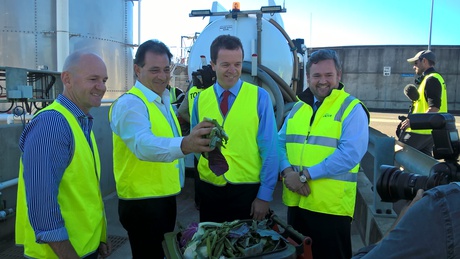Wastewater plant to be powered by vegie scraps

NSW Minister for Primary Industries, Lands and Water Niall Blair has announced a trial to turn food waste into renewable energy to help power the Cronulla Wastewater Treatment Plant — the first of its kind for a utility in Sydney.
The three-year trial, planned to begin at the end of June 2017, will see seven local fruit and vegetable retailers contribute their food waste, to be collected by contractor Pulpmaster. The trial is being jointly funded by Sydney Water and the Office of Environment and Heritage’s Sustainability Advantage Program.
As explained by Phil Woods, energy manager at Sydney Water, biogas is produced naturally as part of the wastewater treatment process. The gas is produced in an anaerobic digester, which treats and stabilises the solids in wastewater. The biogas allows Sydney Water to produce electricity, which is used to power the wastewater treatment plant.
“Adding food waste allows us to increase the amount of biogas and thus increase the amount of self-generated electricity produced,” said Woods. He said Sydney Water expects to have “enough gas to run our 835 kW engine consistently at capacity at Cronulla”, thus providing “over 60% of the electricity demand at the treatment plant” — or enough to power a third of homes in Cronulla for a whole year.
“If the trial is successful, we could potentially take more waste and produce more electricity,” said Woods.
The trial is part of a push by the NSW Government to “lower the amount of electricity we use from the grid, not only to benefit the environment, but also to reduce operating costs of utilities and lower customers’ bills”, said Blair.
“Not only will the food waste help to generate renewable energy to power the plant, it will also save 150,000 wheelie bins of fruit and vegetables per year from landfill — that’s 600 wheelie bins a day, five days a week,” he continued.
“Fruit and vegetable waste which is typically driven many kilometres away for landfill will also now stay in Cronulla,” added NSW Environment Minister and Member for Cronulla Mark Speakman. “This means fewer trucks travelling long distances and a saving of 90,000 km each year.”
Partnership brings innovative fuel solutions to Gippsland
A study by European Energy Australia and Opal at the latter's Maryvale Paper Mill will assess...
Data centres — a missed opportunity for sustainability
The question is no longer whether we need data centres, but how we plan, locate and govern...
Sodium-ion battery may provide greener energy
Scientists say sodium-ion batteries may be the answer to the future of sustainable energy storage...










